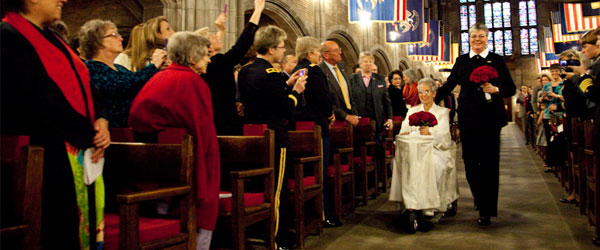Asbury women become first same-sex couple wed at West Point landmark
Couple fought for repeal of Don't Ask Don't Tell
Two Asbury Park residents who fought for the repeal of Don’t Ask Don’t Tell became the first same-sex couple to wed in Cadet Chapel at West Point Academy last weekend.
Brenda Sue Fulton and Penelope Gnesin chose to tie the knot at the West Point landmark on Dec. 1 due to Fulton’s military history and the couple’s involvement in the fight to repeal Don’t Ask Don’t Tell.
Fulton and Gnesin met in 1995 at a community hymn-singing event at Watchung Presbyterian Church in North Plainfield. Fulton and her friends arrived late, stood in the back of the chorus and sang harmony while everyone else sang melody.
“I saw this woman look over my shoulder and smile at me,” Fulton said. “From Penny’s point of view, her choir memebers and all the other folks were singing melody. She finally heard these harmonies coming from the back and that was me, and she got up and asked if she could come sing with us.”
They were a couple by the end of the year. Four years later, they held a commitment ceremony with no legal status. Then, they registered for a domestic partnership when they became legal in New Jersey in 2004. Then, when New Jersey passed civil unions, they held another ceremony.
The couple still wanted a marriage, though, because they found many people still did not consider them to be a married couple when they entered a civil union, even though a civil union is supposed to legally be the same as a marriage.
“Not a single person said to us, ‘Why are you getting married? You already have a civil union,'” Fulton said. “Not one. Because people don’t see them as the same.”
They planned to become married as soon as New Jersey made it legal. But when Gov. Chris Christie vetoed marriage equality at the beginning of the year, they decided to pursue other options.
Gnesin’s health also made the couple want to get married officially, as she is a breast cancer survivor who is currently dealing with multiple sclerosis, Fulton said.
“I just didn’t want to wait any longer,” Fulton said. “When we started thinking about the possibility of getting married in New York, West Point was our first choice.”
Fulton has been connected with West Point since she attended as a cadet. She graduated in 1980 and was commissioned as an Army officer. She left the Army in 1986 as a captain.
Both Fulton and Gnesin, who is medically retired from AT&T, have worked for LGBT equality in the military in recent years, mainly fighting for the repeal of Don’t Ask Don’t Tell. During her struggle to have the law stricken, Fulton was inspired by the words of the Cadet Prayer — “Always choose the harder right instead of the easier wrong, and never settle for half a truth when the whole can be won.”
“Those were our mottos when we were fighting Don’t Ask Don’t Tell,” she said, “because Don’t Ask Don’t Tell just flew in the face of those values.”
The first time Fulton heard those words, she was in Cadet Chapel at West Point. So when it came time to select a venue for their legal marriage, they went with Cadet Chapel.
LGBT people in the military are still treated as single whether or not they are married, so the fight for equality is not over yet, “but we’re getting there,” Fulton said. “It felt to us like it was important to be there in the Cadet Chapel and to continue to stand by those values.”
Fulton was happy to see her military peers embrace their LGBT brethren following the repeal of Don’t Ask Don’t Tell.
“It made it okay for our straight allies to come out,” she said. “While it was in effect, it was very hard for people to express support for gay and lesbian service members. But when a policy changed, we heard so many stories of our gay and lesbian service members saying, ‘I can’t believe my first sergeant or my commander came up to me and said, “I’m so proud of you.”‘”
Fulton and Gnesin have lived in Asbury Park for 18 months, and “love the diversity,” Fulton said. Gnesin has already joined the Democratic committee of the city.
“We feel very much at home, not just because it’s LGBT-friendly, but because there is a warmth and an acceptance for everyone, whatever your income is, whatever your background or race is,” Fulton said.
———-
[Photo by Jeff Sheng.]




